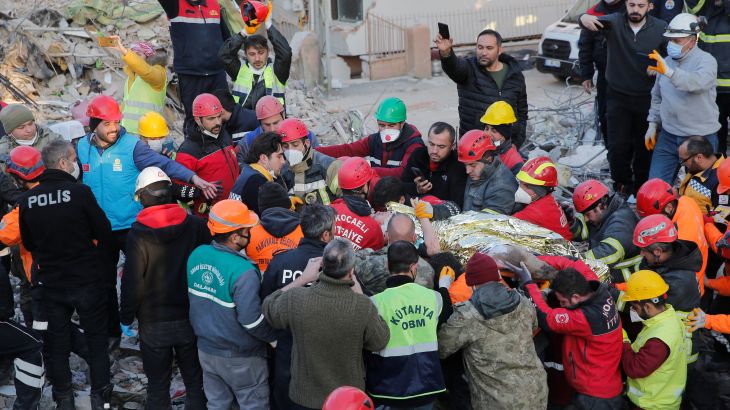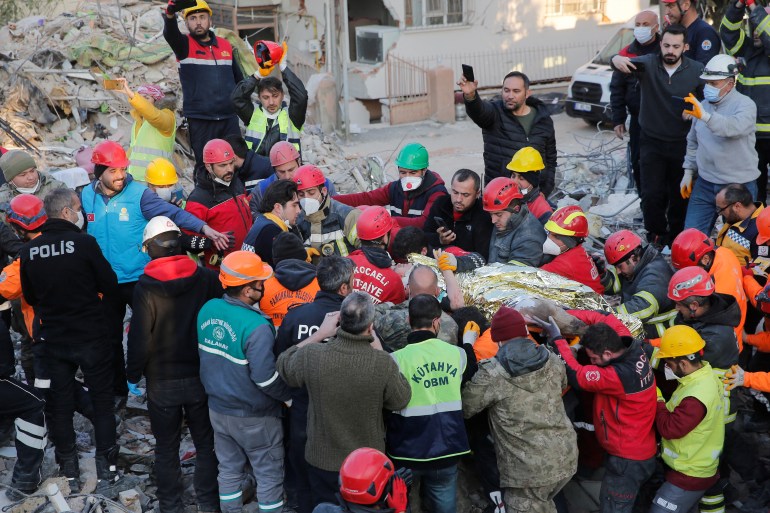Rescue phase ‘comes to a close’ in Turkey-Syria quake disaster
Stories of miraculous rescues flooded the airwaves in recent days, but tens of thousands of dead have also been found with the toll expected to sharply rise.

Rescuers saved a 13-year-old boy from under a collapsed building a week after Turkey’s deadliest modern-day earthquake killed tens of thousands of people as the chances of finding other survivors dwindled.
The teenager – who spent 182 hours under the concrete in Hatay province – held a rescuer’s hand Monday as he was placed on a stretcher, head braced, and covered for warmth before he was moved into an ambulance.
Keep reading
list of 4 items‘Only bones left’: Turkey families look for remains as hopes fade
NW Syria’s stricken residents come together to feed rescue teams
Watch: Turkey earthquake survivors still being rescued a week on
With hopes of finding other survivors in the rubble fading fast, the combined death toll in Turkey and neighbouring Syria from the 7.8-magnitude quake surged above 37,000 and looked set to keep increasing.
In one city, rescuers dug a tunnel to reach a grandmother, mother and daughter from one family who appeared to have survived the February 6 temblor and 7.6 aftershock.
A young girl named Miray was recovered alive in the southeastern Turkish city of Adiyaman and crews were reportedly close to reaching her sister as well. State broadcaster TRT Haber said a 10-year-old girl was rescued in the province of Kahramanmaras.
At least two other children and three adults were also reported to have been saved.
But others were bracing for the inevitable scaling down of search operations as low temperatures reduced the already slim chances of survival and as some Polish rescuers announced they would leave on Wednesday.
In the shattered Syrian city of Aleppo, United Nations aid chief Martin Griffiths said the rescue phase was “coming to a close”.
“Now the humanitarian phase – the urgency of providing shelter, psycho-social care, food, schooling, and a sense of future for these people – that’s our obligation now,” he told reporters.

Three generations trapped
Stories of near-miraculous rescues have flooded the airwaves in recent days, including many that were broadcast live on Turkish television and beamed around the world. But tens of thousands of dead have been found during the same period.
Experts say the window for such rescues has nearly closed given the length of time that has passed, the fact that temperatures have fallen to minus 6 degrees Celsius (21 degrees Fahrenheit), and the severity of the building collapses.
Still, thousands of rescue teams – including Turkish coal miners and experts aided by sniffer dogs and thermal cameras – were searching pulverised apartment blocks for signs of life.
In one dramatic rescue attempt in the Turkish city of Kahramanmaras, rescuers said they had contact with a grandmother, mother and baby trapped in a room in the remains of a three-storey building. Rescuers were digging a second tunnel to reach them after a first route was blocked.
“I have a very strong feeling we are going to get them,” said Burcu Baldauf, head of the Turkish voluntary healthcare team. “It’s already a miracle. After seven days they are there with no water, no food and in good condition.”
On the same street, emergency workers covered a body in a black bag. “This is your brother,” one grieving woman said, with another wailing. “No, no.”
The Turkish toll now exceeds the 31,643 killed in a quake in 1939, Turkey’s Disaster and Emergency Management Presidency said, making it the worst quake in the country’s modern history.
The total death toll in Syria, a nation ravaged by more than a decade of war, has reached 5,714, including those who died in a rebel enclave and government-held areas.
It is the sixth most deadly natural disaster this century behind the 2005 tremor that killed at least 73,000 in Pakistan.
The Turkish Enterprise and Business Confederation, a nongovernmental business organisation, estimated the quake’s financial damage in Turkey alone at $84.1bn.
Some 100km (62 miles) from the epicentre, almost no houses were left standing in the Turkish village of Polat, where residents salvaged refrigerators, washing machines and other goods from wrecked homes.
Not enough tents have arrived for the homeless, said survivor Zehra Kurukafa, forcing families to share those available.
“We sleep in the mud, all together with two, three, even four families,” Kurukafa said.
Turkish authorities said Monday that more than 150,000 survivors have been moved to shelters outside the affected provinces. In Adiyaman, Musa Bozkurt waited for a vehicle to bring him and others to western Turkey.
“We’re going away but we have no idea what will happen when we get there,” said the 25-year-old. “We have no goal. Even if there was [a plan], what good will it be after this hour? I no longer have my father or my uncle. What do I have left?”
Call for Syria aid
The International Monetary Fund has called for an international effort to help Syria where the rebel-held northwest has received little aid.
Only one crossing from Turkey into Syria is now open for UN aid, although the United Nations says it hopes to open two more.
There was growing frustration among aid workers and civilians in Syria’s rebel-held areas.
“We called from the early days of the catastrophe on the UN to intervene immediately,” the head of the Turkey-backed opposition coalition Salem al-Muslet said. “The UN wants to exonerate itself from letting down the liberated areas.”